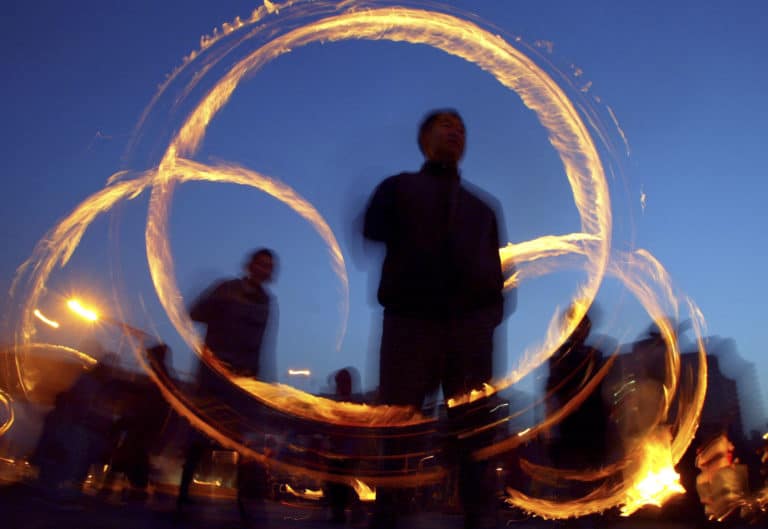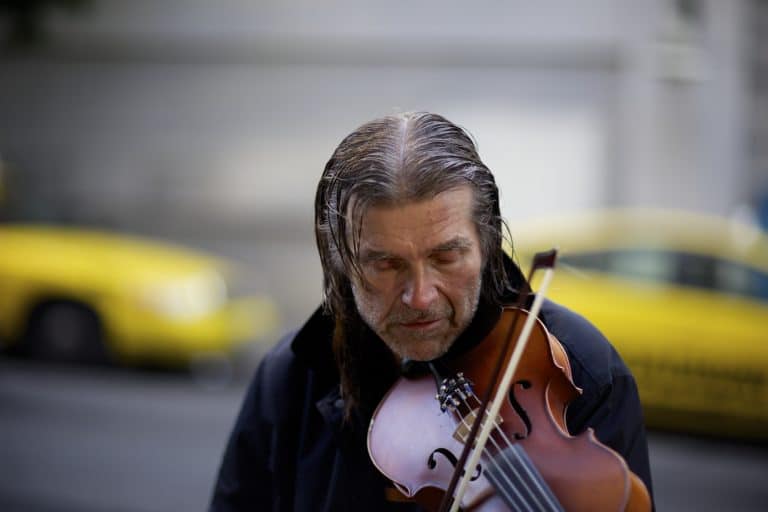
Image by Chung Sung-Jun.
Reclaiming the Campfire: Traveling the Distance That Divides with Stories
“The shortest distance between two people is a story.”
Those are the words that keep bouncing around my brain. I heard them last week, spoken by Kyle Wark, an Indigenous researcher and policy analyst with the Alaska Native Policy Center and member of the Tlingit tribe. He was part of a courageous line-up of speakers that I had the honor of working with at the Aspen Institute’s ThinkXChange, a gathering of people who work on fighting poverty through holistic solutions. They’re called the Ascend Network.
Kyle painted a chilling portrait of the way in which missionaries attempted to eradicate the Tlingit language and wisdom through schools in the colonial tradition right around the turn of the century. The Tlingit people are still reeling from the brutality of that so-called education. Kyle sees the aftershocks in the rampant violence and the addiction; his own mother died of alcoholism far too young.
But in the midst of such a dark story about American past and present, there was a blinding light. Kyle said that what saved him from the fate of so many of his peers, battling with the unhealed wounds of their mothers and grandmothers, fathers and grandfathers, was something as simple and accessible as air: stories. As young as 3 years old, he would sit at the knee of his grandfather and listen to his stories about these brutal schools and about the Tlingit legends that he hadn’t let them take away from him. These stories stuck with him. They became his resistance to the drink and drugs he saw his friends drifting towards.
They put pride in his shy smile, dignity in his backbone, ferocity in his testimony.
(I’m embarrassed to admit that I didn’t know much of the history he spoke about. You can learn more about it here if you, like me, have some ignorance of this particularly cruel and immoral thread of U.S. history.)
His teaching was a gift and reminded me that while our current attention spans are short, poverty has ancient roots in our country. I’m fond of sociologist Elise Boulding’s notion that we each live in a 200-year present, beginning with the birth date of the oldest person we’ve known and stretching up until today. (Kyle would likely argue we live in an even longer present, I would guess).
And yet, so often, when we talk about the wealth gap in this country, we act as if it appeared suddenly, unprecedented, more like a natural disaster than erosion.
But it turns out, even natural disasters aren’t really spontaneous phenomena. Earthquakes build underneath the surface for centuries, tectonic plates shifting as we go about our oblivious business. Hurricanes develop out of the movement of warm air rising, higher pressure pushing into areas with lower pressure over time. Volcanoes erupt after years of the lower density magma rising like air bubbles, one little blip after another, in syrup.
And so goes the immoral and ever widening gap between rich and poor. According to The New York Times, the top 10 percent earned more than half of the country’s overall income in 2012, the highest proportion recorded in a century.
If you think people are poor solely because they’ve made irresponsible decisions, you’re being irresponsible with history. We are not born blank slates. We are delivered into the hands of complex destiny — the struggles and triumphs of our parents and grandparents already influencing how far we can see before our eyes have even learned to focus.
And it’s also more than mythical; it’s utterly practical. Policy shaped those ancestral struggles and triumphs as much, if not more, than personalities. What kind of education did our parents and grandparents get? What languages did they speak? Did they have the opportunity to accumulate any wealth? To own a home? Did they have access to powerful networks where jobs and money circulate? Were their basic rights protected? Were they scared for their safety on a regular basis? Could they afford decent medical care when they needed it?
Attention spans have, perhaps, never been shorter, which is a profound limitation when it comes to accurately understanding how some people get rich and some people stay poor. The only thing more powerful than the whirling dervish of our 24/7 news cycle and the finger pointing it encourages is vulnerable and courageous, well-told heartbreaking and heart-mending stories. Like Kyle’s. Like the other four people who shared their cynicism-defying stories on a special evening last week.
These stories cut through the noise. They bring dead statistics to life. They disrobe the rags to riches oversimplifications. And we need so many more of them. Enlightened policy will, no doubt, help close the income and wealth gaps, but before we get there, we’re going to need to build a lot of will. The way to build a lot of will is going to be, in part, to tell a lot of genuine, compelling stories. Somehow, we have to resist the economic and social segregation that typifies so many of our lives and actually get in rooms together where we can speak and listen, the filter bubble of the Internet popped, the rhetorical walls smashed down by old school connection.
“A story communicates fear, hope, and anxiety, and because we can feel it, we get the moral not just as a concept, but as a teaching of our hearts,” explains community organizer and Harvard professor Marshall Ganz. “That’s the power of story. That’s why most of our faith traditions interpret themselves as stories, because they are teaching our hearts how to live as choiceful human beings capable of embracing hope over fear, self-worth and self-love over self-doubt, and love over isolation and alienation.”
If we are going to be more choiceful citizens, Americans who choose to live in a country where our economic policies actually reflect our understanding of human dignity, then we’re going to have to start reclaiming the campfire. I’ll meet you there.

